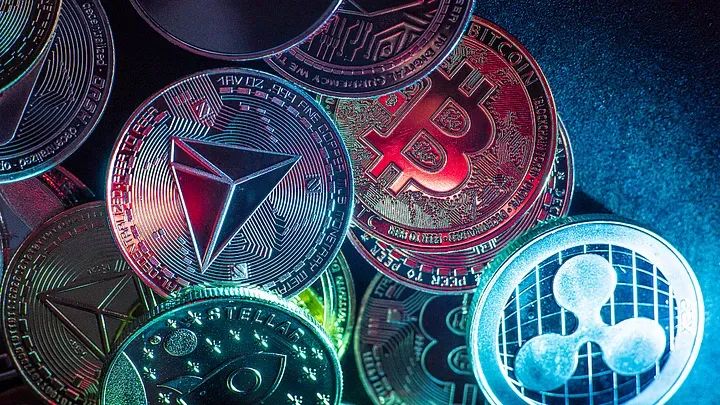-
 Bitcoin
Bitcoin $82,809.3375
5.23% -
 Ethereum
Ethereum $1,920.3699
2.27% -
 Tether USDt
Tether USDt $0.9999
0.04% -
 XRP
XRP $2.1688
7.11% -
 BNB
BNB $551.7435
3.46% -
 Solana
Solana $125.3725
5.54% -
 USDC
USDC $1.0001
0.02% -
 Cardano
Cardano $0.7226
7.18% -
 Dogecoin
Dogecoin $0.1642
6.17% -
 TRON
TRON $0.2244
-2.34% -
 Pi
Pi $1.4167
3.38% -
 UNUS SED LEO
UNUS SED LEO $9.8825
1.37% -
 Chainlink
Chainlink $13.1129
2.96% -
 Hedera
Hedera $0.1958
2.75% -
 Stellar
Stellar $0.2552
4.89% -
 Avalanche
Avalanche $17.4824
6.91% -
 Shiba Inu
Shiba Inu $0.0...01203
4.20% -
 Sui
Sui $2.2286
6.04% -
 Litecoin
Litecoin $90.3860
2.96% -
 Bitcoin Cash
Bitcoin Cash $339.5353
2.14% -
 Toncoin
Toncoin $2.6387
3.99% -
 Polkadot
Polkadot $4.0392
3.82% -
 MANTRA
MANTRA $6.3023
-0.02% -
 Ethena USDe
Ethena USDe $0.9993
0.02% -
 Dai
Dai $1.0000
0.00% -
 Bitget Token
Bitget Token $4.1995
6.74% -
 Hyperliquid
Hyperliquid $13.7284
1.57% -
 Monero
Monero $212.0719
5.12% -
 Uniswap
Uniswap $6.1079
2.81% -
 Aptos
Aptos $5.3066
1.76%
What Is The Difference Between Fungible And Non-Fungible Tokens?
Fungible tokens serve as the interchangeable backbone of cryptocurrencies and digital payments, while non-fungible tokens represent unique digital assets with distinct identities.
Nov 26, 2024 at 01:04 pm

Fungible vs. Non-Fungible Tokens: A Comprehensive Guide
In the realm of blockchain technology, the concept of tokens lies at the core of many applications. Tokens represent digital assets that can be used to facilitate transactions, store value, or represent ownership. However, there exists a fundamental distinction between two types of tokens: fungible tokens and non-fungible tokens (NFTs). This article delves into the multifaceted differences between these two types of tokens, exploring their unique characteristics, use cases, and implications.
Understanding Fungibility
Fungibility, in the context of tokens, refers to the property of being interchangeable and indistinguishable from one another. Fungible tokens, like cryptocurrencies such as Bitcoin and Ethereum, are identical in value and can be exchanged on a one-to-one basis regardless of their specific history or ownership. This means that one Bitcoin is considered equivalent to any other Bitcoin, and they can be used interchangeably without diminishing their value.
Characteristics of Fungible Tokens:
- Interchangeable: Fungible tokens can be easily swapped or exchanged for one another, as their value is determined by their collective supply and demand rather than any unique attributes.
- Uniform Value: Each unit of a fungible token holds the same value as any other unit of the same token. Their worth is determined solely by market forces, not by individual ownership or history.
- Divisible: Fungible tokens can be subdivided into smaller units, allowing for fractional ownership and more precise transactions.
- Use Cases: Fungible tokens serve as the backbone of many blockchain applications, including cryptocurrencies, digital payments, and decentralized exchanges.
Examples of Fungible Tokens:
- Bitcoin (BTC)
- Ethereum (ETH)
- Stablecoins (e.g., Tether, USD Coin)
- Utility Tokens (e.g., Filecoin, Basic Attention Token)
Non-Fungibility: A Unique Identity
In contrast to fungible tokens, non-fungible tokens (NFTs) embody the opposite concept: uniqueness and non-interchangeability. NFTs represent one-of-a-kind digital assets that cannot be replicated or substituted for one another. Each NFT possesses its own distinct identity and value, making it impossible to exchange one NFT for another of equivalent value.
Characteristics of Non-Fungible Tokens:
- Unique: NFTs are designed to be one-of-a-kind, with each token representing a distinct asset or item. They have unique identifiers and metadata that distinguish them from all other NFTs.
- Non-Interchangeable: Due to their unique nature, NFTs cannot be swapped for other NFTs on an equal basis. Each NFT holds its own intrinsic value and cannot be easily compared to other NFTs.
- Indivisible: NFTs are typically indivisible, meaning they cannot be split into smaller units like fungible tokens. They represent an entire ownership claim to the associated digital asset.
- Use Cases: NFTs have gained popularity in various domains, including digital art, collectibles, gaming, and digital identity. They provide a secure and verifiable way to establish ownership over unique digital assets.
Examples of Non-Fungible Tokens:
- Crypto Art (e.g., works by Beeple, Pak)
- Digital Collectibles (e.g., NBA Top Shot, CryptoKitties)
- In-Game Assets (e.g., unique skins in blockchain-based games)
- Digital Certificates (e.g., diplomas, licenses)
Fungible vs. Non-Fungible Tokens: Key Differences
The table below summarizes the key differences between fungible and non-fungible tokens:
| Feature | Fungible Tokens | Non-Fungible Tokens |
|---|---|---|
| Interchangeability | Interchangeable and indistinguishable | Unique and non-interchangeable |
| Value | Determined by supply and demand | Determined by individual uniqueness and demand |
| Divisibility | Can be divided into smaller units | Typically indivisible |
| Use Cases | Cryptocurrencies, digital payments, decentralized exchanges | Digital art, collectibles, gaming, digital identity |
Implications for Blockchain Technology
The distinction between fungible and non-fungible tokens has profound implications for the evolution of blockchain technology. Fungible tokens facilitate efficient value transfer and decentralized financial applications, while NFTs pave the way for the tokenization of unique assets and the creation of scarcity in the digital realm.
The interplay between these two types of tokens creates a rich tapestry of possibilities, opening up new avenues for innovation and value creation in the blockchain ecosystem.
Disclaimer:info@kdj.com
The information provided is not trading advice. kdj.com does not assume any responsibility for any investments made based on the information provided in this article. Cryptocurrencies are highly volatile and it is highly recommended that you invest with caution after thorough research!
If you believe that the content used on this website infringes your copyright, please contact us immediately (info@kdj.com) and we will delete it promptly.
- BNB Price Rebounds Strongly as Bullish Momentum Picks Up, Targeting $605 Resistance
- 2025-03-12 07:10:49
- The Crypto World Trembled Under the Weight of a Dramatic Sell-Off
- 2025-03-12 07:05:49
- JA Mining: A Platform Focusing on Cryptocurrency Mining and Investment Services
- 2025-03-12 07:05:49
- Immutable X Announces the Tokyo Beast CBT Pre-Championship with a $10,000 Prize Pool
- 2025-03-12 07:05:49
- OriginTrail will hold its “Get On Trac(k)” podcast on March 14th at 13:00 UTC.
- 2025-03-12 07:05:49
- Standard Chartered head of digital assets research Geoffrey Kendrick believes Bitcoin's (BTC) recent price action suggests that the flagship crypto may require sovereign accumulation or improved geopolitical clarity to push higher amid the current ris
- 2025-03-12 07:05:49
Related knowledge

What is Ethereum’s Slashing mechanism and how to punish malicious behavior?
Feb 20,2025 at 03:08am
Key PointsOverview of slashingDifferent types of slashing in EthereumIncentives and consequences of slashingIdentifying and reporting slashed validatorsOngoing discussions and potential improvementsEthereum's Slashing Mechanism: Punishing Malicious BehaviorEthereum's slashing mechanism is an essential tool for ensuring network security and punishing mal...

What is the verifier node of Ethereum and how to become a verifier?
Feb 19,2025 at 06:00pm
The Verifier Node of Ethereum: A Comprehensive GuideKey Points:What is a Verifier Node?How to Become a Verifier NodeResponsibilities and Rewards of a Verifier NodeMinimum Requirements for Becoming a Verifier NodePotential Difficulties in Running a Verifier Node1. What is a Verifier Node?A Verifier Node is an independent entity on the Ethereum network th...

What is Ethereum’s staking, and how to participate and earn money?
Feb 19,2025 at 04:37pm
Key Points:Understanding Ethereum's Staking MechanismSteps to Participate in StakingBenefits and Rewards of StakingSecurity and Risk ConsiderationsTechnical Requirements and Hardware OptionsPotential Challenges and Troubleshooting TipsFAQs on Ethereum StakingWhat is Ethereum's Staking?Proof-of-Stake (PoS) is a consensus mechanism used in blockchain netw...

What is Ethereum’s DAO (Decentralized Autonomous Organization) and how does it work?
Feb 20,2025 at 03:12am
Key PointsDefinition and Structure of a DAOGovernance and Decision-Making in DAOsBenefits and Use Cases of DAOsChallenges and Limitations of DAOsWhat is Ethereum's DAO (Decentralized Autonomous Organization) and How Does It Work?Definition and Structure of a DAOA Decentralized Autonomous Organization (DAO) is an innovative governance and management fram...

What is Ethereum's multi-signature wallet and how to improve security?
Feb 20,2025 at 02:18pm
Key Points:Understanding the Concept of a Multi-Signature WalletBenefits and Drawbacks of Multisig WalletsRequirements for Setting Up a Multisig WalletStep-by-Step Guide to Generating a Multisig WalletImplementing Strategies for Enhanced Security1. Understanding the Concept of a Multi-Signature WalletA multi-signature (multisig) wallet in the Ethereum e...

What is Ethereum's oracle and how to provide data for smart contracts?
Feb 21,2025 at 01:30am
Key Points:Understanding the concept of oracles in EthereumExploring different types of oraclesDetailed guide on how to provide data for smart contractsAddressing potential challenges and considerationsWhat is Ethereum's Oracle?Oracles are crucial components in the Ethereum ecosystem, enabling smart contracts to access real-world data and off-chain even...

What is Ethereum’s Slashing mechanism and how to punish malicious behavior?
Feb 20,2025 at 03:08am
Key PointsOverview of slashingDifferent types of slashing in EthereumIncentives and consequences of slashingIdentifying and reporting slashed validatorsOngoing discussions and potential improvementsEthereum's Slashing Mechanism: Punishing Malicious BehaviorEthereum's slashing mechanism is an essential tool for ensuring network security and punishing mal...

What is the verifier node of Ethereum and how to become a verifier?
Feb 19,2025 at 06:00pm
The Verifier Node of Ethereum: A Comprehensive GuideKey Points:What is a Verifier Node?How to Become a Verifier NodeResponsibilities and Rewards of a Verifier NodeMinimum Requirements for Becoming a Verifier NodePotential Difficulties in Running a Verifier Node1. What is a Verifier Node?A Verifier Node is an independent entity on the Ethereum network th...

What is Ethereum’s staking, and how to participate and earn money?
Feb 19,2025 at 04:37pm
Key Points:Understanding Ethereum's Staking MechanismSteps to Participate in StakingBenefits and Rewards of StakingSecurity and Risk ConsiderationsTechnical Requirements and Hardware OptionsPotential Challenges and Troubleshooting TipsFAQs on Ethereum StakingWhat is Ethereum's Staking?Proof-of-Stake (PoS) is a consensus mechanism used in blockchain netw...

What is Ethereum’s DAO (Decentralized Autonomous Organization) and how does it work?
Feb 20,2025 at 03:12am
Key PointsDefinition and Structure of a DAOGovernance and Decision-Making in DAOsBenefits and Use Cases of DAOsChallenges and Limitations of DAOsWhat is Ethereum's DAO (Decentralized Autonomous Organization) and How Does It Work?Definition and Structure of a DAOA Decentralized Autonomous Organization (DAO) is an innovative governance and management fram...

What is Ethereum's multi-signature wallet and how to improve security?
Feb 20,2025 at 02:18pm
Key Points:Understanding the Concept of a Multi-Signature WalletBenefits and Drawbacks of Multisig WalletsRequirements for Setting Up a Multisig WalletStep-by-Step Guide to Generating a Multisig WalletImplementing Strategies for Enhanced Security1. Understanding the Concept of a Multi-Signature WalletA multi-signature (multisig) wallet in the Ethereum e...

What is Ethereum's oracle and how to provide data for smart contracts?
Feb 21,2025 at 01:30am
Key Points:Understanding the concept of oracles in EthereumExploring different types of oraclesDetailed guide on how to provide data for smart contractsAddressing potential challenges and considerationsWhat is Ethereum's Oracle?Oracles are crucial components in the Ethereum ecosystem, enabling smart contracts to access real-world data and off-chain even...
See all articles














































































